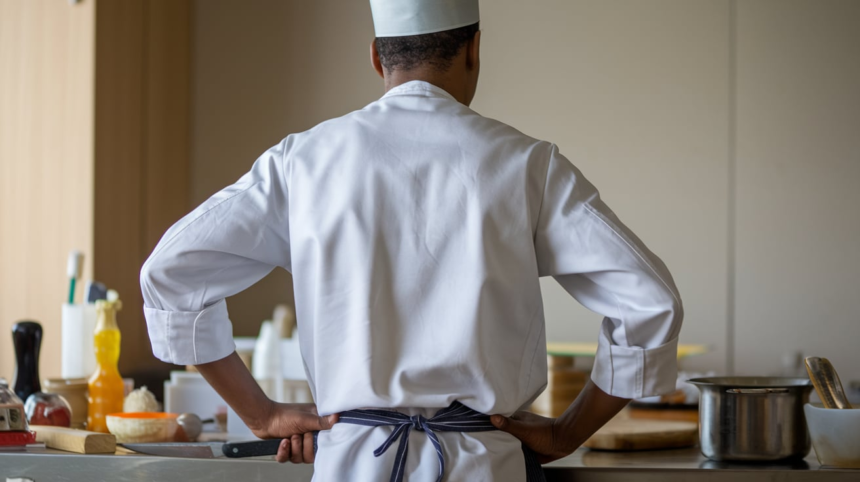Introduction to Hagie Tunkara and his culinary journey
Hagie Tunkara is a name that resonates with culinary enthusiasts and aspiring chefs alike. This remarkable chef has carved out a unique path in the gastronomic world, blending tradition with innovation. From his early days in bustling kitchen environments to becoming a celebrated figure known for his creative dishes, Hagie’s journey is one of passion and dedication.
Hagie Tunkara Chef approach to cooking goes beyond just following recipes; it’s about understanding ingredients, mastering techniques, and embracing diverse culinary cultures. If you’re looking to elevate your own culinary skills or simply want to understand what makes Hagie Tunkara such an inspiring figure in the food community, you’re in the right place. Let’s dive into eight essential steps that can lead you toward your own culinary excellence!
Step 1: Mastering the Fundamentals of Cooking
To embark on a culinary journey, mastering the fundamentals of cooking is essential. This involves understanding basic techniques like chopping, sautéing, and baking. Each method serves as a building block for more complex dishes.
Start by honing knife skills. A sharp knife and proper technique can transform your efficiency in the kitchen. Practice makes perfect here.
Next, familiarize yourself with precise measurements and ingredient handling. Knowledge about temperature control is also key—knowing when to simmer or sear can elevate your dish significantly.
A solid grasp of these basics allows for creativity later on. It builds confidence that every aspiring chef needs as they experiment further in their culinary adventures.
Remember, even renowned chefs return to these fundamentals periodically; it’s where true mastery begins.
Step 2: Developing Your Palate
Developing your palate is an essential step in becoming a great chef. It’s more than just tasting food; it’s about understanding flavors, textures, and aromas.
Start by experimenting with different ingredients. Try unique spices or unfamiliar vegetables. Each ingredient tells its own story, adding layers to your culinary repertoire.
Taste foods from various cuisines. Explore the complexity of Indian curries or the simplicity of Italian pasta dishes. Notice how balance plays a crucial role in flavor profiles.
Keep a food journal to document your experiences. Write down what you taste and how each dish makes you feel. This practice helps refine your senses over time.
Attend tastings whenever possible. Whether it’s wine pairing or cheese sampling, these events sharpen your ability to identify subtle nuances in taste.
Don’t be afraid to ask questions when dining out or cooking with others—great chefs always seek knowledge from their surroundings.
Step 3: Understanding Different Cuisines
Exploring different cuisines of Chef Hagie Tunkara is a vital step in your culinary journey. Each culture offers unique flavors, ingredients, and cooking techniques that can elevate your skills.
Start with regional dishes. They tell stories of tradition and heritage. From Italian pasta to Thai curry, immerse yourself in the history behind each recipe.
Next, consider traveling or dining at authentic restaurants. This firsthand experience allows you to taste nuances that books sometimes miss. Pay attention to spices and cooking methods used by local chefs.
Don’t forget about fusion cuisine either! Blending techniques from various cultures can spark creativity in your own kitchen. Experimenting with unexpected combinations often leads to delightful surprises.
Understanding these diverse culinary backgrounds not only enriches your palate but also enhances your overall cooking repertoire. Embrace the world’s flavors as endless inspiration for innovation awaits.
Step 4: Learning from Experienced Chefs
Learning from experienced chefs is a crucial step in any culinary journey. These seasoned professionals carry a wealth of knowledge that can transform your skills.
Observing their techniques offers valuable insights into precision and creativity. You’ll notice how they handle ingredients, manage time, and present dishes with finesse.
Mentorship plays a significant role here. Establishing relationships with these experts opens doors to opportunities you might not find on your own.
Ask questions during kitchen shifts or seek advice when facing challenges. Their feedback can be invaluable in refining your approach to cooking.
Additionally, many renowned chefs share their experiences through workshops or culinary schools. Participating in these sessions helps broaden your understanding while fostering connections within the industry.
Embrace every chance to learn; each interaction could spark inspiration for your own culinary creations.
Step 5: Experimenting with Ingredients and Techniques
Experimentation is where true culinary magic happens. It’s about pushing boundaries and discovering new flavors.
Start by playing with ingredients you love. Swap out a common herb for something unexpected, or try using unique spices that catch your eye. You might be surprised by the results.
Techniques are equally important. Don’t just stick to what you know; play around with different cooking methods. Try sous-vide if you’ve always baked, or explore fermentation for a twist on traditional dishes.
Document your experiments. Take notes on what worked and what didn’t, including measurements and timing adjustments. This creates a personal reference guide as you refine your skills.
Invite friends over for taste tests of your latest creations. Their feedback will provide insights into how others perceive your culinary adventures, helping you grow even further in this vibrant world of flavor exploration.
Step 6: Networking and Building Connections in the Culinary Industry
Networking is crucial in the culinary world. Building connections can open doors to opportunities you never imagined.
Start by attending food festivals, cooking workshops, and industry events. These gatherings are perfect for meeting fellow chefs and food enthusiasts. Engage in conversations, share your experiences, and learn from others.
Social media platforms like Instagram or LinkedIn also play a vital role. Follow established chefs, engage with their content, and showcase your work. Authentic engagement can lead to meaningful relationships that benefit your career.
Don’t underestimate local communities too. Join culinary groups or clubs where members share similar passions and goals. Collaborating on projects can enhance skills while fostering camaraderie.
Remember that networking isn’t just about taking; it’s also about giving back. Offer help or support when possible—this builds trust and strengthens bonds within the community. Your network will become an invaluable resource as you progress in your culinary journey.
Step 7: Staying Up-to-Date
Staying up-to-date in the culinary world is essential for any aspiring chef. Trends evolve rapidly, and what was popular last year might be outdated now.
Follow industry publications, food blogs, and social media channels dedicated to gastronomy. Chefs share innovations that can inspire your own creations.
Attending workshops or cooking classes helps you learn new techniques firsthand. The hands-on experience reinforces your skills while introducing you to contemporary culinary practices.
Networking at food festivals or local events also opens doors to fresh ideas. Engaging with fellow chefs fuels creativity and keeps your approach dynamic.
Don’t forget about technology’s impact on cooking trends as well! Exploring new kitchen gadgets can elevate your dishes and streamline processes in the kitchen.
Incorporating seasonal ingredients into your menu ensures freshness while aligning with current dining preferences. Stay curious; there’s always something new waiting just around the corner.
Step 8: Unique Culinary Voice
It is about embracing your unique culinary voice. This journey is not just about skills—it’s also an expression of who you are.
Take the time to reflect on what inspires you in the kitchen. Whether it’s a favorite childhood dish or a passion for sustainable ingredients, let that shape your creations.
Experiment with fusion techniques or reinterpret traditional recipes through your lens. The beauty of cooking lies in its ability to tell stories. Your story deserves to be heard.
Don’t shy away from sharing your dishes, whether it’s through social media or local events. Feedback will help refine your style and build confidence.
By staying true to yourself while being open to growth, you’ll carve out a niche that resonates with others and fulfills you creatively.
Conclusion
Hagie Tunkara’s journey to becoming a renowned chef showcases the dedication and passion required in the culinary world. By following these eight steps, aspiring chefs can sharpen their skills and elevate their craft.
Culinary excellence doesn’t happen overnight. It requires persistence and an eagerness to learn. Whether you’re mastering cooking fundamentals or experimenting with new ingredients, each step is crucial in developing your unique style.
As you continue on your path, remember that inspiration often comes from unexpected places. Embrace every opportunity for growth, build connections within the industry, and stay curious about global cuisines.
With commitment and creativity, anyone can carve out their place in the vibrant tapestry of culinary arts—just like Hagie Tunkara has done throughout his impressive career. Your journey may just be beginning; make it count!










